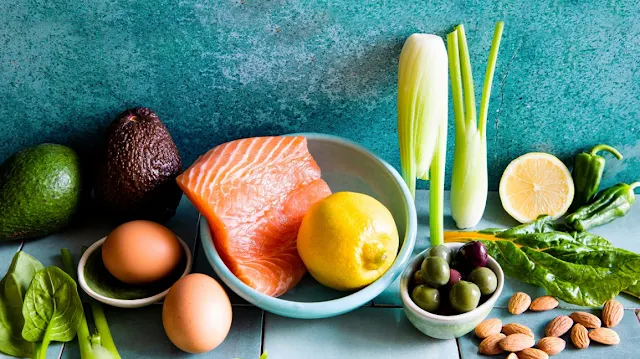Keto Diet Foods To Avoid in 2022 | Keto Diet Foods To Eat And Avoid | Pros and Cons of a Keto Diet Meal Plan |
Keto Diet Foods To Avoid in 2023 | Keto Diet Foods To Eat And Avoid |
What is Keto Diet?
The ketogenic diet, also known as the "keto diet," is a high-fat, low-carbohydrate diet that has gained popularity in recent years as a weight loss and health improvement strategy. The goal of the diet is to get the body into a state of ketosis, where it is burning fat for energy instead of carbohydrates. This is achieved by drastically reducing carbohydrate intake and increasing fat intake.
To follow a keto diet, you will need to drastically reduce your intake of carbohydrates and increase your intake of healthy fats. This typically involves cutting out sugary foods, grains, and starchy vegetables, and replacing them with foods like avocados, nuts, seeds, and coconut oil. You should also aim to eat moderate amounts of protein, such as chicken, beef, and fish.
There are several benefits to following a keto diet for weight loss and diabetes. One of the main benefits is that it can help you lose weight quickly and effectively, as it can help to reduce appetite and increase fat burning. It can also help to improve insulin sensitivity, which can be beneficial for those with diabetes or prediabetes.
It's important to note that the keto diet is not for everyone, and it's important to consult with a healthcare professional before starting any new diet. Some people may experience side effects such as the "keto flu," which is a group of symptoms that can occur when the body is adjusting to a low-carb diet. These symptoms can include dizziness, fatigue, and irritability, but they usually go away after a few days.
If you're considering starting a keto diet for weight loss or diabetes, it's important to do your research and make sure you're getting all of the nutrients you need. This may involve taking supplements or eating fortified foods to ensure you're getting enough vitamins and minerals. It's also important to stay hydrated, as the keto diet can cause an increase in urination and a loss of electrolytes.
Keto Diet Foods To Eat And Avoid
Keto Diet Foods To Eat
Keto Diet Foods To Avoid
Tips for Success on a Keto Diet
Plan ahead: Planning your meals and snacks in advance can help you stick to your keto diet and avoid temptation. Make a grocery list and shop for keto-friendly foods, and consider meal prepping for the week ahead.
Monitor your carb intake: It is important to carefully track your carb intake to ensure that you are staying within your daily carb limits. Use a food tracking app or keep a food journal to help you stay on track.
Stay hydrated: Adequate hydration is important on a keto diet, as it can help to flush out toxins and support healthy digestion. Aim to drink at least 8-10 glasses of water per day.
Get enough electrolytes: The keto diet can lead to a loss of electrolytes, such as sodium, potassium, and magnesium. It is important to consume these electrolytes through your diet or through supplements to prevent deficiencies.
Choose high-quality fats: Not all fats are created equal. Choose healthy, high-quality fats, such as those found in avocados, nuts, and olive oil, to support your health and weight loss efforts on a keto diet.
Don't skip meals: Skipping meals can lead to overeating later on and may make it harder to stick to your keto diet. Aim to eat at regular intervals throughout the day to help keep your appetite and cravings in check.
Get enough sleep: Adequate sleep is important for overall health and can help support weight loss efforts. Aim for 7-9 hours of sleep per night to help your body recover and repair.
Seek support: It can be helpful to have support from friends, family, or a healthcare professional when starting a new diet. Consider joining a support group or seeking guidance from a registered dietitian or nutritionist.
Is it helpful to take Keto diet plan for weight loss or diabetes ?
The ketogenic diet, or keto diet, has been shown to be effective for weight loss and the management of diabetes in some individuals. However, it's important to note that the keto diet is not a one-size-fits-all solution, and it may not be appropriate or beneficial for everyone.
There is some evidence to suggest that the keto diet can be an effective tool for weight loss and the management of diabetes. One study found that the keto diet was more effective for weight loss and improving blood sugar control in people with type 2 diabetes compared to a low-fat diet. Other research has also found that the keto diet can improve insulin sensitivity and lead to weight loss in people with prediabetes.
However, it's important to note that the keto diet can be challenging to follow and may not be suitable for everyone. It's important to consult with a healthcare professional before starting a keto diet, especially if you have diabetes or are taking medications for diabetes. It's also important to ensure that you are getting all of the nutrients you need, as the keto diet may be low in certain vitamins and minerals.
The keto diet has become increasingly popular in recent years as a way to lose weight and improve overall health. This high-fat, low-carb diet involves drastically reducing carbohydrate intake and replacing it with healthy fats. While the keto diet can be effective for weight loss and other health benefits, it can be challenging to stick to a strict meal plan. Here are some tips for planning keto meals and incorporating them into your routine at fitness centers.
One key aspect of the keto diet is monitoring your carbohydrate intake. Most people on the keto diet aim to consume fewer than 50 grams of carbs per day. To help reach this goal, it's important to choose keto-friendly foods that are low in carbs but high in healthy fats and protein. This includes meats, seafood, eggs, nuts and seeds, avocados, and full-fat dairy products.
While it's important to limit your intake of carbohydrates, it's also important to include a variety of vegetables in your diet. Leafy greens, cruciferous vegetables, and low-carb fruits such as berries can provide important nutrients and fiber while helping you stay within your carb limits.
To plan your keto meals, it can be helpful to make a list of your favorite keto-friendly foods and meal ideas. This will make it easier to plan and prepare your meals in advance, whether you're eating at home or on the go. It can also be helpful to have keto snacks on hand to help keep you satisfied between meals. Good options include nuts, seeds, hard-boiled eggs, and low-carb protein bars or shakes.
If you're a member of a fitness center, there are several ways to incorporate keto meals into your routine. Many fitness centers have kitchens or designated meal prep areas where you can store and prepare your own food. This can be especially convenient if you have a busy schedule and need to grab a quick meal before or after your workout.
If you don't have access to a kitchen at your fitness center, you can still follow the keto diet by packing your own meals and snacks to take with you. This might include pre-made keto lunches or dinners, as well as snacks like nuts, seeds, or protein bars.
Advantages and Disadvantages of the Ketogenic Diet: Pros and Cons of a Keto Diet
Pros of a Keto Diet:
Cons of a Keto Diet:
Conclusion:
The keto diet can be an effective weight loss and health improvement strategy for some individuals. By choosing keto-friendly foods and avoiding high-carb options, you can help your body reach and maintain ketosis. However, it is important to consult with a healthcare professional before starting any new diet, as the keto diet may not be suitable for everyone.
Overall, the keto diet can be a effective way to improve your health and reach your fitness goals. By planning ahead and being mindful of your carbohydrate intake, you can easily incorporate keto meals into your routine at fitness centers and on the go. The keto diet may be helpful for weight loss and the management of diabetes in some individuals, but it's important to approach it with caution and make sure you are getting the proper nutrients. It's always a good idea to consult with a healthcare professional before making any major changes to your diet.



